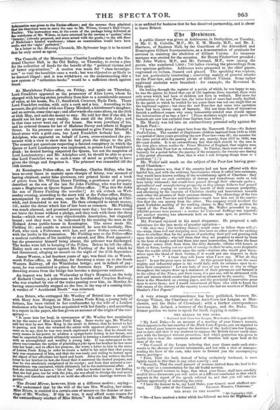At Marylebone Police-office, on Friday, and again on Thursday, Lord
Frankfort appeared as the prosecutor of Alice Lowe, whom he charged with having stolen jewellery from him to a considerable amount of value, at his house, No. 17, Southwick Crescent, Hyde Park. There Lord Frankfort resides, with only a cook and a boy. According to his account, the girl called with one Fanny Mitchell, a hairdresser's daughter, and an actress, some time ago ; and afterwards she came alone, on the 26th or 28th May, and said she meant to stay. He told her that if she did, he should not let her go very readily. She staid till the 28th July ; and in that time never went out of the house. She wore jewellery of his, and he ordered dresses for her of Madame Davey and others in Regent Street. In his presence once she attempted to give Fanny Mitchell a blood-stone with a gold case, but Lord Frankfort forbade her. Mr. Adolphus, who appeared on behalf of Lowe, cross-examined the prosecutor with a view to show that he had given the things to the girl. The counsel put questions respecting a fancied conspiracy in which the Queen or Lord Londonderry was implicated, to poison Lord Frankfort's drink : he denied having suspected the Queen but not the suspicion of Lord Londonderry ; and Mr. Adolphus said, he should be able to prove that Lord Frankfort was in such a state of mind as probably to have given the things and forgotten it. The prisoner was remanded till the 15th instant.
At Kensington Police-office, on Tuesday, Charles Ridley, who has been several times in custody upon charges of felony, was accused of having obtained, under false pretences, two printed books and a book of prints from Mr. William Henry Fielding, a gentleman of property, described as the son of the late Sir John Fielding, who was for many years a Magistrate at Queen Square Police-office. [Was this Sir John the son of Henry Fielding the novelist?] At six o'clock on Wednesday evening, according to the story told at the Police-office, Ridley, accompanied by another man, came to Mr. Fielding's lodging at Chiswick, and demanded to see him. He then attempted to extort money, la., under the threat which has of late been so common. Mr. Fielding was much alarmed, and promised money next day ; but the men would not leave the house without a pledge, and they took with them the threg books—which were of a very objectionable description, but elegantly bound ; and they were to be redeemed by his meeting the men at the Holland Arms public-house in Kensington. The scene made Mr. Fielding ill ; and unable to attend himself, he sent his landlady, Mrs. Ford, who took a Policeman with her, and gave Ridley into custody, with the books in his possession. Mr. Fielding sent to the Police-office a medical certificate of his inability to attend, and Mrs. Ford appeared ; but the prosecutor himself being absent, the prisoner was discharged. The books were left in keeping of the Police. Before he left the office, Ridley took out a warrant against Mr. Fielding of the kind which he had threatened, alleging an assault on the night of the 27th September.
James Weston, a lad fourteen years of age, was fined 10a. at Wandsworth Police-office, on Monday, for throwing a stone on to the South Western Railway, off the Wimbledon bridge; and in default of payment, he was committed to prison for fourteen days. The practice of throwing stones from the bridge has become a dangerous nuisance.
An inquest was held on Wednesday at Guy's Hospital, on the body of Richard Crossby, a policeman on the London and Croydon Railway, who was crushed by one of the trains passing over him, on Monday, he having unaccountably stepped on the line, in the way of a coming train. A verdict of "Accidental Death" was returned.


























 Previous page
Previous page